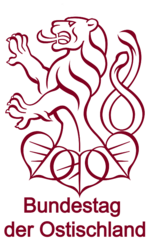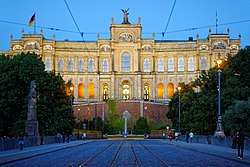Bundestag of Werania: Difference between revisions
Britbong64 (talk | contribs) m (Britbong64 moved page Reichstag of Werania to Bundestag of Werania) |
Britbong64 (talk | contribs) No edit summary |
||
| Line 1: | Line 1: | ||
{{Infobox legislature | {{Infobox legislature | ||
| name = Bundestag of Werania | | name = Bundestag of Werania | ||
| native_name = Bundestag | | native_name = Bundestag der Ostischland | ||
| coa_pic = Parliament of Werania logo.png | | coa_pic = Parliament of Werania logo.png | ||
| coa_res = 150px | | coa_res = 150px | ||
| Line 84: | Line 84: | ||
| footnotes = | | footnotes = | ||
}} | }} | ||
The '''Bundestag of Werania''' ({{Wp|German language|Weranian}}: '''Bundestag | The '''Bundestag of Werania''' ({{Wp|German language|Weranian}}: '''Bundestag der Ostischland'''; ''Federal Diet'') is the {{wp|Bicameralism|bicameral}} {{Wp|legislature}} of the [[Werania]]. It consists of an {{Wp|upper house}} known as the [[Herrstag]] (Lord's Chamber) and a {{wp|lower house}} known as the [[Volkstag]] (People's Chamber) whilst the monarch presides over parliamentary proceedings. It retains {{wp|parliamentary sovereignty}} over Werania, officially being the representative of the Weranian people. Members of the ''Herrstag'' are referred to as Peers whilst members of the ''Volkstag'' are known as the {{Wp|members of parliament}} (MP's). | ||
The Bundestag took its current form in 1842 following the unification of Werania, being based on the former Reichstag of the [[Kingdom of Cislania]]. The Lord's Chamber was initially entirely hereditary or appointed by the monarch of Werania whilst members of the People's Chamber were elected in a {{Wp|first-past-the post}} system. In 1905 the government introduced {{Wp|single-non transferable voting}} for the People's Chamber, which has remained the voting system since. The Lord's Chamber remained unreformed until 1988 when the government changed the composition of the Chamber to entirely elected. | The Bundestag took its current form in 1842 following the unification of Werania, being based on the former Reichstag of the [[Kingdom of Cislania]]. The Lord's Chamber was initially entirely hereditary or appointed by the monarch of Werania whilst members of the People's Chamber were elected in a {{Wp|first-past-the post}} system. In 1905 the government introduced {{Wp|single-non transferable voting}} for the People's Chamber, which has remained the voting system since. The Lord's Chamber remained unreformed until 1988 when the government changed the composition of the Chamber to entirely elected. | ||
Revision as of 20:04, 28 June 2020
Bundestag of Werania Bundestag der Ostischland | |
|---|---|
 | |
| Type | |
| Type | |
| Houses | Herrstag Volkstag |
| Leadership | |
Monarch | Charlotte II since 22 March 2014 |
Speaker of the Herrstag | |
Speaker of the Volkstag | |
| Structure | |
| Seats | 232 (Herrstag) 545 (Volkstag) |
 | |
Herrstag political groups | |
 | |
Volkstag political groups | |
| Elections | |
| First-past-the-post | |
| Single non-transferable vote | |
Herrstag last election | 2017 |
Volkstag last election | 2019 |
Herrstag next election | 2021 |
Volkstag next election | 2023 |
| Meeting place | |
 | |
| Palace of Parliament, Westbrücken, Werania | |
The Bundestag of Werania (Weranian: Bundestag der Ostischland; Federal Diet) is the bicameral legislature of the Werania. It consists of an upper house known as the Herrstag (Lord's Chamber) and a lower house known as the Volkstag (People's Chamber) whilst the monarch presides over parliamentary proceedings. It retains parliamentary sovereignty over Werania, officially being the representative of the Weranian people. Members of the Herrstag are referred to as Peers whilst members of the Volkstag are known as the members of parliament (MP's).
The Bundestag took its current form in 1842 following the unification of Werania, being based on the former Reichstag of the Kingdom of Cislania. The Lord's Chamber was initially entirely hereditary or appointed by the monarch of Werania whilst members of the People's Chamber were elected in a first-past-the post system. In 1905 the government introduced single-non transferable voting for the People's Chamber, which has remained the voting system since. The Lord's Chamber remained unreformed until 1988 when the government changed the composition of the Chamber to entirely elected.
Currently 245 seats in the Volkstag elected via proportional lists and 300 through first-past-the-post. Since 2014 all seats in the Herrstag are elected by provincial legislatures after the government abolished the final monarchical appointed seats.